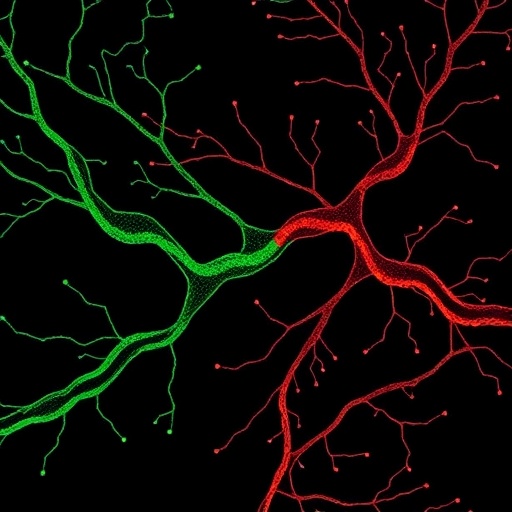In the relentless quest to conquer some of the deadliest cancers, researchers have illuminated a novel therapeutic vulnerability nestled deep within the epigenetic machinery of tumor cells. At the heart of this breakthrough lies NSD2, an enzyme long implicated in driving oncogenic processes through the specific epigenetic modification of histone H3 at lysine 36, known as H3K36me2. Now, pioneering work reveals that precise inhibition of NSD2’s catalytic activity can effectively “rewire” chromatin landscapes, thwarting malignant gene expression programs and halting tumor progression in formidable lung and pancreatic cancers.
NSD2 functions as a histone methyltransferase, catalyzing the dimethylation of H3K36, a key epigenetic mark that orchestrates chromatin accessibility and gene expression. This enzyme’s overactivity has been observed in a spectrum of cancers, where it acts as a critical downstream effector of oncogenic signaling cascades, particularly those driven by mutant KRAS variants. Despite NSD2’s recognized role, direct pharmacological targeting of its enzymatic function had remained elusive—until now.
The current study introduces a series of clinical-grade small-molecule inhibitors specifically designed to inhibit NSD2, collectively referred to as NSD2i. These molecules exhibit exceptional potency, achieving half-maximal inhibitory concentrations in the single-digit nanomolar range, while demonstrating remarkable selectivity over related methyltransferases. This selectivity is paramount to minimizing off-target effects and maximizing therapeutic impact. Structural elucidations reveal that NSD2i achieve their specificity by competitively binding to the enzyme’s cofactor site—where the methyl donor S-adenosylmethionine (SAM) usually docks—thereby obstructing substrate access and crippling enzymatic activity through a unique binary-channel blockade.
Functionally, the sustained exposure of cancer cells to NSD2 inhibitors triggers a profound epigenomic reconfiguration. The pathological H3K36me2 mark, which otherwise promotes oncogenic chromatin plasticity and gene activation, is substantially diminished. This erosion of aberrant methylation landscape enables a resurgence of the repressive H3K27me3 legacy marks, reinstating the silencing of malignancy-associated gene clusters. Consequently, the epigenetic alterations culminate in the downregulation of key oncogenic transcriptional programs, effectively impairing cancer cell viability.
The translational potential of NSD2i is underscored by rigorous preclinical evaluations. In both pancreatic and lung cancer models driven by KRAS mutations, treatment with these inhibitors suppresses tumor growth, including in patient-derived xenograft models that recapitulate human cancer heterogeneity. Remarkably, NSD2 inhibitors demonstrate good tolerability in vivo, with minimal adverse effects, which is often a barrier in epigenetic therapy development.
Further adding to their clinical promise, NSD2 inhibitors have been tested alongside sotorasib, a recently approved KRAS G12C inhibitor. When administered in combination, the two agents act synergistically, synergizing to dramatically extend survival and induce extensive tumor regression in autochthonous mouse models representing late-stage disease. This synergy proposes a compelling dual therapeutic axis: targeting oncogenic signaling pathways and their epigenetic effectors conjointly, inching closer to durable clinical responses.
This work marks a significant leap in our understanding of the epigenetic dependencies underpinning KRAS-driven malignancies. By directly crippling the NSD2–H3K36me2 axis, researchers have validated a previously unexploited vulnerability that transcends conventional oncogene inhibition paradigms. These insights not only deepen our grasp of cancer’s epigenomic architecture but also present a strategic blueprint for next-generation combination therapies.
Diving further into the mechanistic nuances, NSD2i operates by a binary-channel obstruction mechanism, an innovative mode of action elucidated through high-resolution structural analyses. Unlike typical competitive inhibitors, these molecules simultaneously block access to substrate and cofactor sites, effectively “jamming” the enzyme’s catalytic machinery. This mechanistic insight could guide the refinement of future inhibitors and inform drug design beyond NSD2.
On the molecular stage, the interplay between H3K36me2 and H3K27me3 is critical in maintaining chromatin states and gene expression patterns that dictate cellular identity and behavior. NSD2-driven H3K36me2 deposition antagonizes Polycomb-mediated H3K27 methylation, promoting an open chromatin state conducive to oncogene expression. NSD2 inhibition tilts this balance back towards repression, highlighting the dynamic and reversible nature of chromatin states as therapeutic targets.
Clinically, these findings carry particular weight due to the notoriously poor prognosis of KRAS-mutant pancreatic and lung cancers. Current therapies often falter due to intrinsic or acquired resistance, underscoring the urgency for novel strategies. NSD2 inhibition not only directly impairs tumor growth but primes tumors for enhanced sensitivity to KRAS blockade, paving the way for combinatorial regimens that might overcome resistance hurdles and induce sustained remissions.
The research team’s multidisciplinary approach—integrating structural biology, epigenomics, proteomics, and sophisticated in vivo modeling—paints a comprehensive picture of NSD2 as an actionable node in oncogenic networks. This holistic perspective enables confident translation from bench to bedside, with ongoing efforts likely focused on clinical trial design and biomarker development to identify patients most likely to benefit.
In summary, the discovery and characterization of NSD2 inhibitors represent a transformative advance in cancer epigenetics. By selectively targeting the enzymatic activity of NSD2, these compounds induce a robust epigenetic reset, reversing oncogenic chromatin signatures that sustain cancer cell proliferation and survival. The synergy observed with KRAS inhibitors offers a potent combinatorial therapeutic avenue, sparking hope for improved outcomes in some of the most treatment-resistant cancers.
As the oncology community eagerly anticipates further clinical evaluation, this landmark study offers a compelling narrative: that targeted epigenetic therapy, once a distant goal, is now within tangible reach. Unlocking the therapeutic potential of the NSD2–H3K36me2 pathway may well herald a new era where cancer’s epigenetic code is not just read but decisively rewritten to patient benefit.
Subject of Research: NSD2 enzyme inhibition as a therapeutic strategy in KRAS-driven lung and pancreatic cancers through epigenetic reprogramming.
Article Title: NSD2 inhibitors rewire chromatin to treat lung and pancreatic cancers.
Article References:
Jeong, J., Hausmann, S., Dong, H. et al. NSD2 inhibitors rewire chromatin to treat lung and pancreatic cancers. Nature (2025). https://doi.org/10.1038/s41586-025-09299-y
Image Credits: AI Generated




